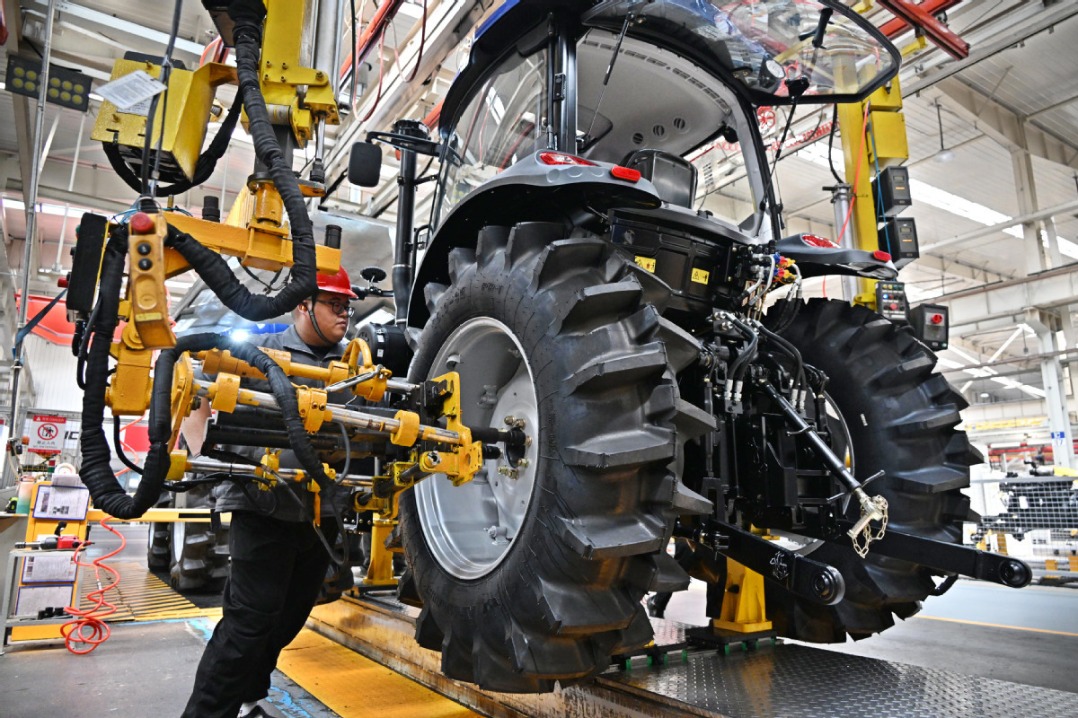Expanded car-carrying vessel fleet spurs shipping capacity


The expansion of China's car-carrying vessel fleet will diminish domestic automakers' dependence on foreign shipowners, thus reinforcing the country's export capabilities and effectively addressing supply chain disruptions, said experts and shipbuilders on Thursday.
Their comments came following the departure of China's largest dual-fuel-powered car carrier from Shanghai to Europe on Wednesday. The maiden voyage of the vessel will carry 5,000 vehicles manufactured in China to Europe. At least half of these cars being transported are new energy vehicles, according to information released by Shanghai Customs.
This move represents the first investment in a car carrier by SAIC Anji Logistics Co, a logistics unit owned by Shanghai-based SAIC Motor Corp Ltd. The vessel, built by China State Shipbuilding Corp Ltd, is capable of accommodating up to 7,600 vehicles. Its dual-fuel engines are able to reduce carbon emissions by 30 percent compared to traditional fuel engines.
This initiative has realized the goal of "using domestically built vessels for transporting Chinese-made vehicles". It represents a major milestone for China's shipbuilding, maritime shipping and automotive sectors, said Wang Xiaoqiu, president of SAIC Motor.
There were about 750 car carriers globally by the end of 2022, with a total capacity of around 4 million vehicles. Shipping companies from Japan, South Korea and Norway held more than 80 percent of the market share in this segment, according to the latest data released by London-based shipping services provider Clarkson Plc.
Among these, Japanese shipowners own the largest fleet, with nearly 300 vessels, accounting for 40 percent of the global car carrier fleet. Chinese operators owned around 40 car carrier ships, making them the fifth-largest fleet in the world.
Eager to compete with other global rivals, SAIC Anji Logistics plans to expand its transport fleet over the next three years, adding a total of 14 car carriers with varying capacity levels, aiming to further support the export of domestic automotive brands.
A 7,000-unit car carrier, operated by Chinese electric vehicle maker BYD, also departed from a port in Shenzhen, Guangdong province, destined for Europe on Tuesday. The vessel was built by CIMC Raffles, a subsidiary of Chinese logistics and energy equipment maker China International Marine Containers (Group) Co Ltd.
Zhang Zhuo, deputy director of the product development department at the innovation center of Shanghai Merchant Ship Design and Research Institute, said that the industry grapples with a shortage of car-carrying vessels due to the surge in Chinese new energy vehicle exports, leading to increased shipping costs for international transport.
To tackle this issue, Chinese shipyards have been operating at maximum capacity to meet rising demand from both shipping companies and automakers, said Zhang.
China exported 5.22 million vehicles in 2023, soaring 57.4 percent year-on-year, said the General Administration of Customs. The Beijing-based China Association of Automobile Manufacturers expects auto exports this year to reach about 5.5 million units.
The delivery schedule for car carriers in China is fully booked until 2027. This, coupled with the eagerness of major domestic automakers to place orders, reflects a promising outlook for the sector, said Xu Lian, vice-president of China Merchants Jinling Shipyard (Jiangsu) Co, a Yangzhou, Jiangsu province-based shipyard.
"This will serve to alleviate the constraint of China's automobile logistics relying on Japanese, South Korean and Norwegian shipping companies," said Xu, adding that his company is currently developing ships capable of carrying over 10,000 vehicles.
To remain dominant in the global market, Norway's Wallenius Wilhelmsen ASA signed a deal with China Merchants Jinling Shipyard (Nanjing) Co last year for delivery of four 9,350-unit methanol-capable and ammonia-ready car carriers, and options for an additional eight vessels. The four vessels will be delivered from mid-2026 onwards by the Chinese shipyard.
zhongnan@chinadaily.com.cn




































